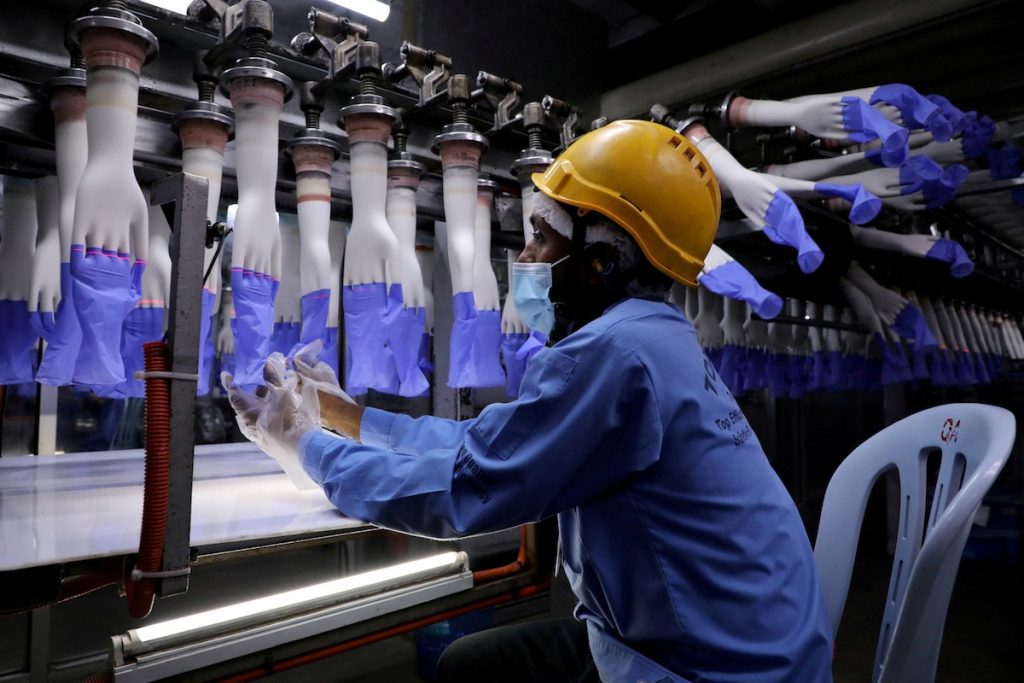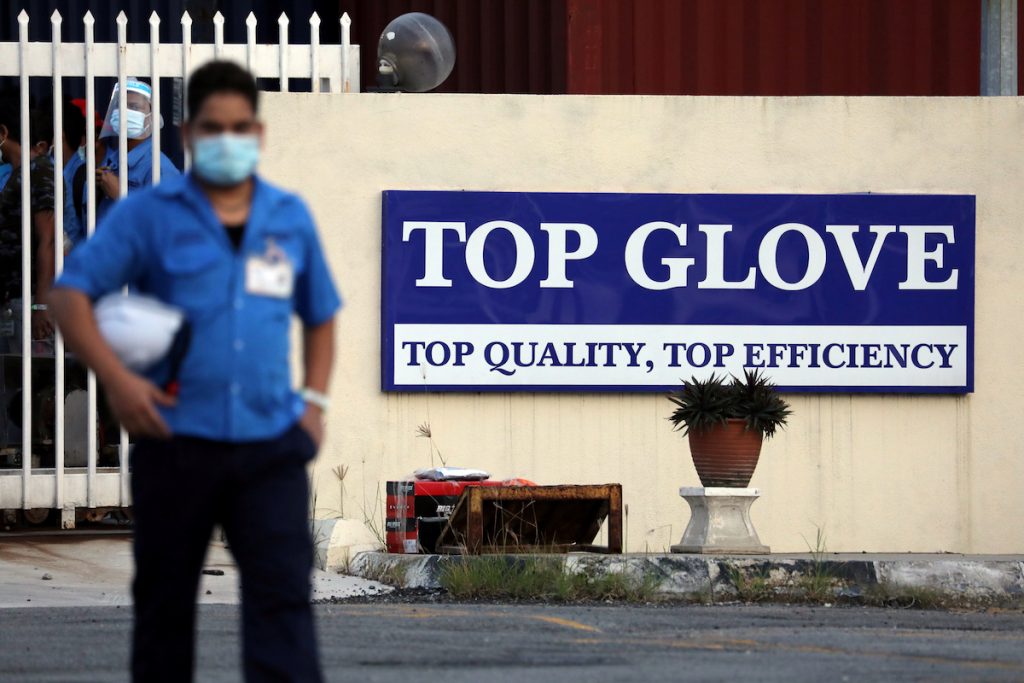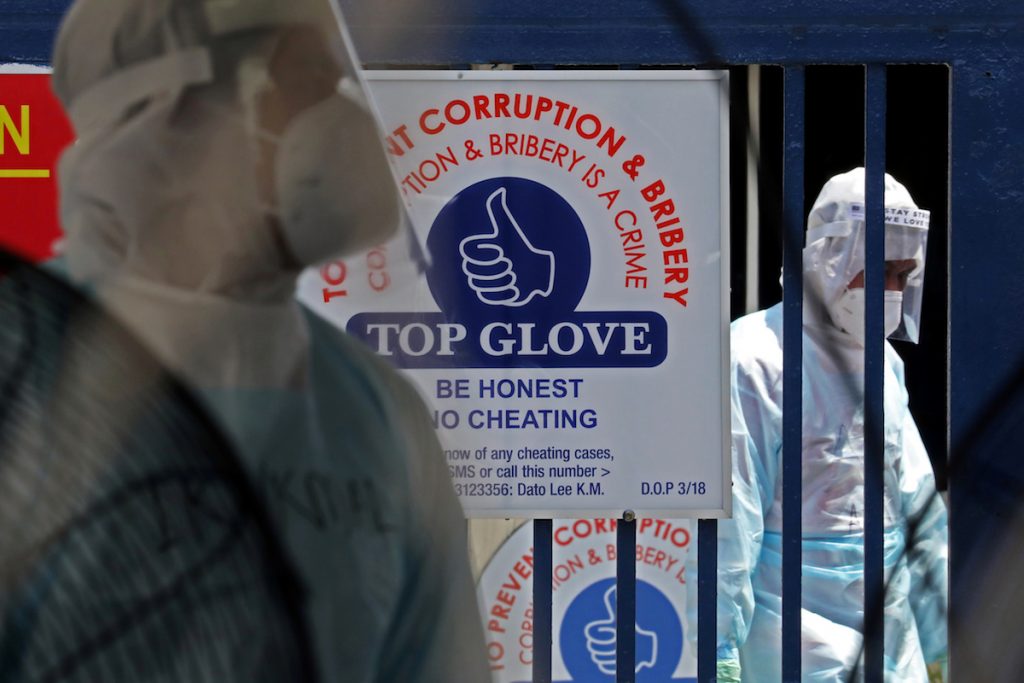
It has been a topsy-turvy year for Malaysia’s largest rubber glove manufacturer, Top Glove.
Six months ago, it was riding high. As the global COVID-19 pandemic was really beginning to bite, health services around the world were screaming for personal protective equipment, not least rubber gloves.
While the Malaysian economy reeled from one pandemic body blow after another, Top Glove boomed, boasting record profits and a soaring share price.
Based in the port city of Klang, Top Glove has risen in less than 30 years to become the world’s leading manufacturer of rubber gloves, with a 26 percent market share, as well as condoms and other rubber products.
However, a segment by British network Channel 4 News highlighted a perennial issue that Malaysia tries to keep under wraps: treatment of migrant workers.
The report focused on Top Glove — domestically hailed as a model of good business — and how it had responded to global demand at the expense of its foreign workforce.
Accusations of paying workers less than minimum wage, excessive overtime, wage theft and squalid living conditions were all levied at Top Glove and casually rebuffed.
Yet, further accusations of ignoring social distancing and hygiene practices required to allow the company’s factories to operate would have ominous repercussions.
Of course, the film may have opened a few eyes in the UK but it caused barely a ripple in Southeast Asia. Top Glove’s treatment of its migrant workforce is pretty much par for the course in this neck of the woods.
Indeed, Top Glove saying it is working towards improvements and that the report picking up isolated incidents are the first of a long list of prepared excuses that will keep anyone sticking his or her nose into company business occupied until the news cycle moves elsewhere.
Which it does. The Channel 4 film was not the first — nor will it be the last — report on Malaysian employment practices.
However, what the company did not bank on was a series of explosive events in the US, with their roots stemming back to its historic inability to fully shed the shackles of a slave-based economy.

As such, the mere whiff of the word slavery had US Customs and Border Patrol (CBP) slamming the door shut on Top Glove imports, citing its own investigation.
This was far from the hammer blow of corporate extinction, but it was a slap across the face that made Top Glove sit up and take note.
The US is not the company’s prime export market, but it is influential enough to cause problems beyond its own borders.
So, for three months up to September, Top Glove wrangled with the CBP to try and have the restrictions lifted, including commissioning independent auditors to review factory and living conditions for its migrant workforce.
Top Glove says it has submitted the report to the CBP but has declined to give any further details and says the contents of the document are strictly confidential, which is odd given that it is a publicly listed company and a document such as this would surely be subject to shareholder scrutiny.
Meanwhile, last month, Top Glove’s apparent disregard for hygiene regulations came back to bite it when workers began falling sick from the coronavirus. Reuters reported that a 29-year-old Top Glove Corp worker from Nepal passed away on Dec. 12 due to COVID-19. It was the first death of a company worker from the disease.
Ominously, the Channel 4 exposé was prophetic in its warning that something like this would happen, pointing to similar issues in Singapore.
What began as a few cases literally exploded into a full-blown crisis, eclipsing that of the pandemic ravaging the eastern state of Sabah. Almost 5,500 reported cases of COVID-19 in Malaysia can be traced back to Top Glove.
The authorities moved quickly to place the company’s dormitories under strict quarantine, affecting 27 of 48 factories.
This is no mean feat, as Top Glove houses roughly 13,000 employees in the area. On top of which, given the sheer numbers of people involved, the Ministry of Health raced to isolate the infected and keep those testing negative safe within the razor wire of the quarantine zone.
The living conditions Channel 4 highlighted proved to be the tip of the iceberg. As healthcare workers moved in to try and stem the crisis, they reported numerous health code violations.
The Human Resources Ministry also found some dormitories did not meet minimum building standards for housing workers.
So far, Top Glove is facing more than 20 charges of failing to provide adequate shelter for its staff and more may follow. Each charge, according to the ministry, carries a fine of US$12,000.
So, on the face of it, it sounds like the big bad wolf may face the full force of Malaysian justice, but the reality is any punitive measures are highly unlikely.
The Human Resources Ministry has given the company eight months’ grace to rectify its housing issue before deciding whether to press charges.
Aside from which, ministries in Malaysia are renowned for their initial bluster and chest-thumping but little in the way of action.
As such, the Human Resources Ministry is seen as a toothless organisation, lacking decisiveness and it remains to be seen whether it will even bother to follow up.

If the crisis has blown over and Top Glove is no longer in the spotlight, then probably not.
The upshot of which is that Top Glove will take a financial hit from the downtime in production, but once the virus is contained, it will be business as usual.
Reporters will come and go with their insights into human rights abuses and modern-day slavery, pricking the conscience of middle-class western society from time to time, but companies operating in the region know that this is merely like dealing with an irritating mosquito bite.
The more PR-savvy companies will act contrite and promise reform, while others will simply try to swat the irritant away.
They know the same countries that cast withering and condescending glances in this direction cannot satisfy their insatiable hunger for natural resources like palm oil and rubber, which need to be brought to market by an inexhaustible supply of labor that will quite literally work for nothing.
In that respect, the momentary pious indignation of western consumers rapidly fades in the face of cheap, high quality goods on the supermarket shelves and the ability to turn a blind eye to anything unsavoury not happening on their doorstep.
Gareth Corsi is a freelance journalist based in Malaysia. The views expressed in this article are the opinions of the author and do not necessarily reflect the editorial stance of LiCAS.news.
Source: Licas Philippines
0 Comments